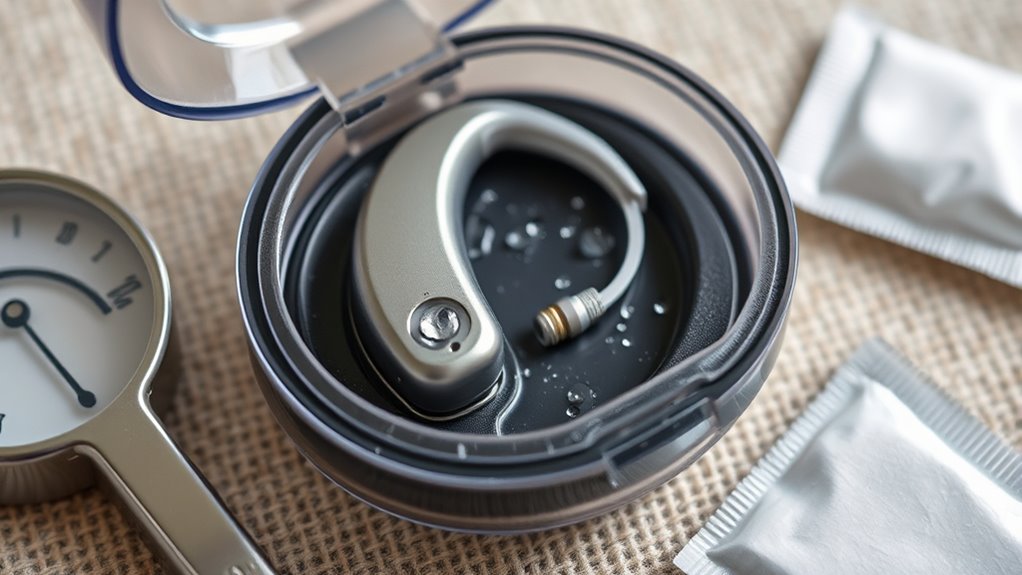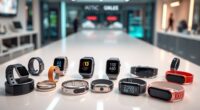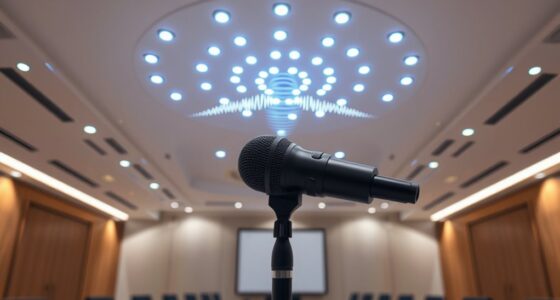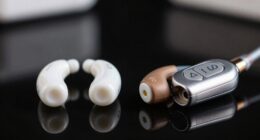To protect your hearing devices from humidity, you should store them in cool, dry places and avoid exposing them to steamy environments like bathrooms or kitchens. Regularly use desiccants, silica gel packs, or specialized drying kits to absorb moisture. Remove your devices during sweating or temperature changes to prevent condensation. Proper maintenance and moisture control help extend their lifespan and keep them working properly. Keep exploring to learn more about safeguarding your investment.
Key Takeaways
- Use dehumidifiers, drying kits, and silica gel packs to remove moisture from hearing devices regularly.
- Store hearing aids in cool, dry environments away from humid areas like bathrooms or cars.
- Remove devices during sweating or steamy conditions to prevent moisture intrusion.
- Choose hearing aids with advanced sealing technology for better moisture resistance.
- Regularly inspect and clean devices to detect early corrosion and maintain optimal performance.
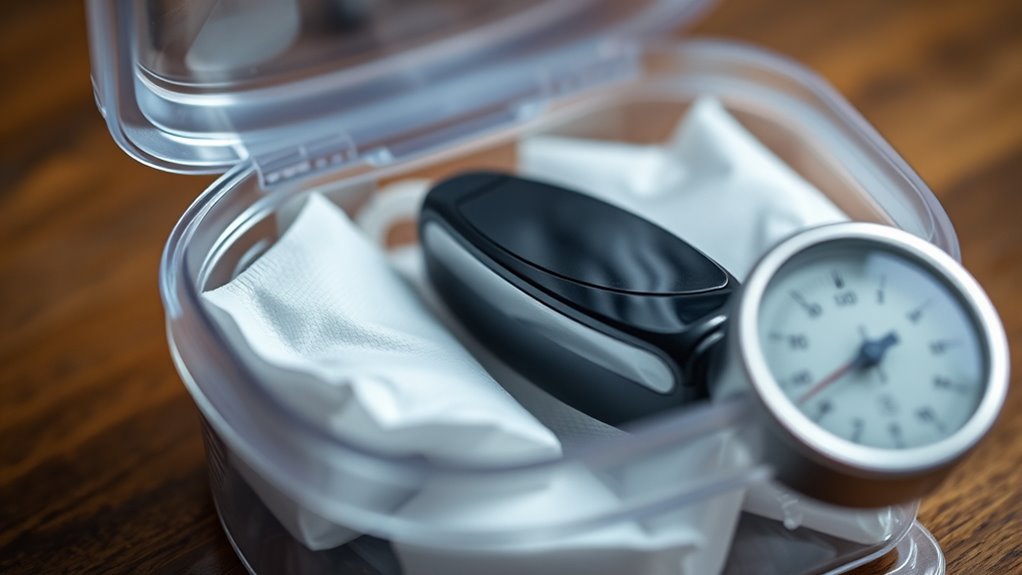
Have you ever wondered how humidity affects your hearing aids and other hearing technology? Humidity can be sneaky, quietly causing damage that reduces your device’s performance over time. One of the biggest issues is battery corrosion, which occurs when moisture seeps into the device and interacts with the metal parts inside the battery. This corrosion can lead to poor battery life, unexpected shutdowns, or complete device failure. If you live in a humid climate or experience rapid temperature changes, you’re especially at risk. That’s why moisture control is essential. Using dehumidifiers or special drying kits designed for hearing aids can help keep moisture at bay, preventing corrosion and extending the life of your devices. Proper storage is also key—keep your hearing aids in a cool, dry place and avoid leaving them in humid environments like bathrooms or cars.
You might not realize it, but even small amounts of moisture can cause significant harm over time. When humidity levels rise, your hearing aids can absorb moisture through tiny openings or cracks. Once inside, this moisture can lead to corrosion of internal components, including the circuitry and battery contacts. Corrosion not only shortens your device’s lifespan but can also distort sound quality and cause static or buzzing noises. It’s not just about comfort; it’s about maintaining the integrity of your investment. To combat this, many users opt for moisture control accessories, such as silica gel packs or specialized drying chambers, which help absorb excess moisture and prevent it from settling inside your hearing devices. Regularly cleaning your hearing aids with a soft cloth and checking for signs of corrosion can catch problems early before they worsen. Additionally, choosing hearing devices with advanced sealing technology can provide extra protection against environmental humidity.
Additionally, it’s wise to remove your hearing aids when you’re sweating excessively, like during intense exercise or in steamy environments. Doing so minimizes the exposure to humidity that can accelerate corrosion. If you notice your hearing aids aren’t holding a charge or seem less responsive, moisture might be the culprit. In such cases, using a dedicated hearing aid dryer or desiccant can dry out internal components and restore functionality. Remember, moisture isn’t just an inconvenience—it’s a real threat to the longevity and performance of your hearing technology. Taking proactive steps for moisture control isn’t complicated, and it pays off by protecting your investment and ensuring your devices work reliably when you need them most. With a little care and attention, you can keep your hearing aids functioning *best* despite the challenges posed by humidity.
Frequently Asked Questions
How Often Should I Have My Hearing Aids Checked for Humidity Damage?
You should have your hearing aids checked for humidity damage at least every six months. Regular inspections help catch issues early, ensuring peak performance. Remember to practice good battery maintenance and follow storage tips—keep your devices in a dry, cool place when not in use. If you notice reduced sound quality or moisture buildup, see your audiologist sooner. Routine checkups keep your hearing aids functioning well and protect your investment.
What Are the Signs of Humidity-Related Issues in Hearing Devices?
You might notice moisture buildup inside your hearing devices, which can cause them to malfunction or sound distorted. Signs include reduced sound quality, intermittent operation, or strange noises. If you see corrosion or notice a musty smell, humidity-related issues are likely at play. To prevent damage, regularly check for signs of moisture buildup and clean your devices. Proper corrosion prevention methods help extend your hearing aids’ lifespan and maintain ideal performance.
Can Humidity Affect Different Hearing Aid Models Differently?
Think of your hearing aid as a finely tuned instrument—its resilience varies by model. Humidity can indeed affect different hearing aid models differently, especially those with varying levels of moisture resistance. Devices designed for higher durability withstand moisture better, ensuring longevity. You can protect your investment by choosing models with strong device durability and moisture resistance, so your hearing aids perform at their best even when faced with humid environments, much like a seasoned sailor steering rough seas.
Are There Specific Environments Where Humidity Is More Harmful?
Certain environments are more harmful to your hearing aids, especially marine environments and humid climates. In these settings, high humidity can cause moisture buildup, leading to damage or malfunction. You should take extra precautions, like storing your devices in dry, ventilated areas and using protective cases or desiccants. Regular maintenance and prompt drying after exposure help guarantee your hearing aids stay in good condition and function effectively.
What Are the Long-Term Effects of Humidity Exposure on Hearing Technology?
They say, “An ounce of prevention is worth a pound of cure,” and that’s true for your hearing tech. Long-term humidity exposure can cause moisture corrosion and battery deterioration, reducing device lifespan and performance. Over time, these issues lead to costly repairs or replacements. To keep your investment safe, avoid humid environments and regularly maintain your devices, ensuring they stay protected from moisture damage and function most effectively.
Conclusion
To safeguard your hearing tech, controlling humidity isn’t just a convenience—it’s crucial. While some believe desiccants alone keep devices safe, studies suggest that consistent environmental monitoring offers superior protection against moisture damage. By maintaining stable humidity levels, you extend your investment’s lifespan and guarantee peak performance. Don’t rely solely on quick fixes; instead, adopt a thorough approach. Your hearing tech works best when you’re proactive, aware, and committed to safeguarding it from the hidden threat of humidity.

